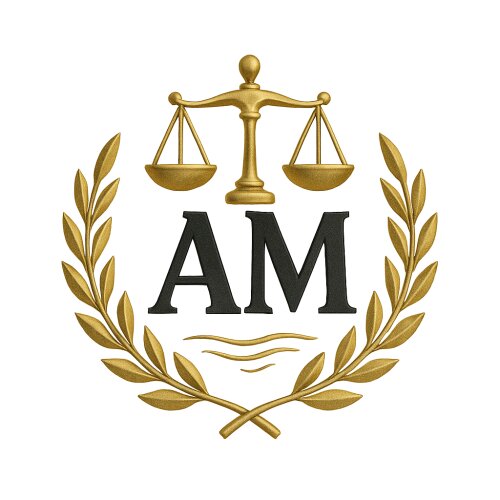Best Foreclosure Lawyers in Mława
Share your needs with us, get contacted by law firms.
Free. Takes 2 min.
Free Guide to Hiring a Real Estate Lawyer
List of the best lawyers in Mława, Poland
About Foreclosure Law in Mława, Poland
Foreclosure in Mława - as in the rest of Poland - is a judicial and administrative process by which a creditor enforces payment against a debtor who has failed to meet obligations secured by property. Most commonly foreclosure concerns mortgages - a right in rem registered in the land and mortgage register - but enforcement can also target other assets such as bank accounts, wages, or movable property. Enforcement actions are carried out by a court-appointed enforcement officer - a komornik - based on an enforceable title such as a court judgment, a notarial deed with an enforcement clause, or another execution title recognised by Polish law.
Local institutions that play a role include the Sąd Rejonowy (district court) in Mława - which handles civil cases and keeps land and mortgage registers - and the komornik attached to that court who conducts enforcement and public auctions of seized property. The process is governed by national legislation - especially the Code of Civil Procedure - and by specific acts on mortgages and consumer credit where applicable.
Why You May Need a Lawyer
Foreclosure affects important property rights and can lead to loss of a home or other assets. A lawyer can help in many situations where legal knowledge and procedural skill are critical:
- To review and challenge the enforceable title - for example to check whether the creditor has a valid court judgment or enforcement clause in a notarial deed.
- To assess the validity of a mortgage inscription in the land and mortgage register and to challenge irregularities in registration.
- To negotiate with the lender - for payment plans, loan restructuring, or a voluntary sale to avoid enforced auction.
- To represent you before the court or komornik in objections to enforcement measures - for instance objection to seizure of essential household items, disputes over priority of creditors, or procedural defects in enforcement.
- To advise on consumer-protection issues - for example claims about unlawful contract terms or controversial foreign-currency mortgage clauses.
- To defend tenants or co-owners when a property that others occupy is subject to enforcement.
Local Laws Overview
Key legal instruments and rules relevant for foreclosure in Mława include national statutes and local procedural practice:
- Code of Civil Procedure - sets out civil enforcement rules, powers of komornik, procedures for seizure and public auction, timelines, and possibilities to object to enforcement.
- Civil Code and mortgage law provisions - regulate rights in rem, priority of mortgages, and establishment and removal of encumbrances in the land and mortgage register - księga wieczysta - maintained by the district court.
- Consumer credit and banking regulation - when the debtor is a consumer, special protections may apply under consumer credit law and general protections against unfair contract terms.
- Auction rules - when real estate is sold in enforcement, the komornik organises public auctions. The minimum opening price is set with reference to an expert valuation - typically a percentage of valuation for the first public auction and a lower percentage if a second auction is required. Exact percentages and auction practices are governed by the Code of Civil Procedure and komornik practice.
- Local procedural practice - the Sąd Rejonowy in Mława and the komornik offices operating there follow national law but may have local routines and contacts that affect scheduling, filing locations, and administrative steps. It is important to know which court division and which komornik handles a given case.
Frequently Asked Questions
What are the first steps a lender takes before foreclosure begins?
Typically the lender issues a demand for payment and may charge default interest and enforcement costs. If the debtor does not pay, the lender seeks an enforceable title - usually a court judgment or a notarial deed with an enforcement clause - and then submits it to a komornik who starts enforcement. For mortgages banks often start court proceedings to obtain an enforceable ruling.
How will I know if my property is in danger of being foreclosed in Mława?
You will be informed by formal documents - letters from the lender, court summonses, or notices from the komornik. You can also check the land and mortgage register - any new enforcement charges or mortgage inscriptions are recorded there. If you receive any enforcement papers, act quickly - deadlines for objections and requests are short.
Can I stop foreclosure once enforcement has started?
Yes - in some cases. You may be able to pay the debt or reach a settlement with the creditor, obtain a court order suspending enforcement, file legal objections to enforcement for procedural defects, or ask the komornik for a payment plan. A lawyer can advise on the best tactical option depending on the stage of enforcement.
What happens at a komornik auction of real estate in Poland?
A komornik organises a public auction - licytacja - of seized property. The komornik sets a minimum price based on an expert valuation. If the property does not sell in the first auction, a second auction with a lower minimum price may be scheduled. The auction winner pays the purchase price and the komornik distributes proceeds among creditors according to legal priority. The sale procedure and price thresholds follow the Code of Civil Procedure.
How long does the foreclosure process usually take?
The timeline varies widely. If the creditor already has an enforceable title, the komornik can begin enforcement within weeks, but sale of real estate can take many months from seizure to auction and transfer. If the creditor first has to obtain a court judgment, that can add several months or longer. Delays are common due to appeals, objections, valuation, and auction scheduling.
What rights do co-owners or tenants have when a property is foreclosed?
Co-owners and tenants have procedural and substantive rights. Co-owners must be notified and can raise objections. Tenants may have the right to remain for the period specified by law or contract, and eviction follows legal procedures. A lawyer can help protect occupancy rights and negotiate solutions that minimise displacement.
Can I challenge the mortgage or its priority in the land and mortgage register?
Yes. You can challenge the validity of a mortgage inscription if there are grounds - for example if the entry was made without proper consent, was based on forged documents, or if formal registration procedures were not followed. Priority disputes between creditors can also be litigated. Challenges require court filings and evidence, so legal assistance is strongly advisable.
Are there consumer protections for people with mortgage loans?
Consumers have special protections under Polish and EU law. Courts can strike down unfair contract clauses, recharacterise certain loan terms, and in some cases reduce a consumer debt. Special attention has been given to foreign-currency denominated mortgages in past years. If you are a consumer, consult a lawyer experienced in consumer-credit litigation.
What costs will I face during foreclosure and can they be reduced?
Costs include the original debt, interest, enforcement fees, komornik fees, valuation and auction costs, and legal fees. Some costs are set by law, while others can be negotiated with the creditor. If you can demonstrate inability to pay or procedural errors, some fees may be limited. A lawyer can review the enforcement costs and challenge unjustified charges.
Where can I find the current information about a property - land and mortgage register or other records?
The authoritative source is the land and mortgage register - księga wieczysta - kept by the district court. The register shows ownership, mortgages, and other encumbrances. Tax and cadastral information is available at the local municipal office and the starostwo powiatowe, which hold records on property taxes and land-use designations. If you need certified extracts or copies, the court registry will provide them on request.
Additional Resources
When you need reliable information or assistance in Mława, consider these types of resources:
- Sąd Rejonowy in Mława - civil division and land and mortgage register office for court filings and extracts.
- Komornik publiczny attached to the Sąd Rejonowy in Mława - for procedural questions about specific enforcement cases.
- Starostwo Powiatowe and Urząd Miasta Mława - for cadastral, planning, and local tax information that may affect property.
- Powiatowy Rzecznik Konsumentów and national consumer protection authorities for help with consumer loan disputes and unfair contract terms.
- Krajowa Izba Komornicza and local chamber of komornik for general information on enforcement practice.
- Free legal aid points - municipal or county-run free legal advice schemes - for initial guidance if you cannot afford a private lawyer.
- Experienced local lawyers - adwokaci or radcowie prawni - who specialise in civil enforcement, real estate, and consumer-credit law.
Next Steps
If you are facing potential or ongoing foreclosure in Mława, follow these practical steps:
- Do not ignore any court papers, letters from your lender, or notices from the komornik. Missing deadlines can remove important legal options.
- Gather documents - loan agreements, mortgage deeds, payment records, court correspondence, land and mortgage register extracts, identity records, and any correspondence with the lender.
- Check the land and mortgage register for entries affecting your property and confirm who holds the mortgage and its rank.
- Contact a lawyer experienced in enforcement and mortgage law for a prompt assessment. If you cannot afford private counsel, seek free legal aid through local municipal programmes or the Powiatowy Rzecznik Konsumentów.
- Consider quick negotiation with the creditor - ask for a payment plan, temporary moratorium, or voluntary sale. A lawyer can help structure and secure any agreement.
- If enforcement has already started, explore immediate legal defences - objections to enforcement, motions to suspend execution, or proposals for instalment payments - all of which are time-sensitive.
- Keep records of all communications and receipts. Clear documentation improves your position in negotiations and in court.
Facing enforcement is stressful, but timely action and knowledgeable legal advice significantly improve the chance of reaching a manageable outcome. If you are unsure about next steps, prioritise getting a consultation with a lawyer or with a local legal aid provider in Mława.
Lawzana helps you find the best lawyers and law firms in Mława through a curated and pre-screened list of qualified legal professionals. Our platform offers rankings and detailed profiles of attorneys and law firms, allowing you to compare based on practice areas, including Foreclosure, experience, and client feedback.
Each profile includes a description of the firm's areas of practice, client reviews, team members and partners, year of establishment, spoken languages, office locations, contact information, social media presence, and any published articles or resources. Most firms on our platform speak English and are experienced in both local and international legal matters.
Get a quote from top-rated law firms in Mława, Poland — quickly, securely, and without unnecessary hassle.
Disclaimer:
The information provided on this page is for general informational purposes only and does not constitute legal advice. While we strive to ensure the accuracy and relevance of the content, legal information may change over time, and interpretations of the law can vary. You should always consult with a qualified legal professional for advice specific to your situation.
We disclaim all liability for actions taken or not taken based on the content of this page. If you believe any information is incorrect or outdated, please contact us, and we will review and update it where appropriate.










